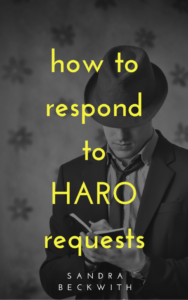Want to sell more books? Treat authorship as a business
When I was employed by a large corporation, I took advantage of a professional development budget that let me attend conferences and training programs. I was able to learn about everything from speechwriting to how to use new technology.
I brought that corporate approach to lifelong learning with me when I became self-employed. The world is changing quickly, so I invest in both in-person and virtual training and education. It helps me embrace what’s working today and ditch what worked five years ago, but isn’t relevant anymore.
I am, after all, running a business here. And if you want to sell books, you need to start running a business, too.
But this “authorship is a business” concept only applies if you want people to discover, read, and recommend your books. You might be someone who writes books as a hobby and isn’t interested in readers and sales.
Which one are you?
A hobbyist writes for the pure joy of writing. That author can’t imagine not writing. The process itself is the motivation — and it’s a good one!
While the author who wants to sell books might also love to write, she knows that there’s much, much more to book publishing than writing. It’s a business that covers book production, distribution, marketing, promotion, and publicity.
Of course, there are always expenses associated with running a business. And that brings me back to my first point about professional development. If you plan to self-publish, you have to learn how to manufacture a book. (I’ve counseled many authors who made costly mistakes because they didn’t learn about the process before they started.)
Know how to market your book
And no matter how you publish — self or traditional, e-book or printed book or both — you will need to know how to market your book. It’s not an “if you build it, they will come” business. Nobody can buy a book they’ve never heard of. To sell more books, you have to learn about marketing.
Get everything you need to know in the four modules of each of the two Book Marketing 101 courses — there’s one for fiction, another for nonfiction. Visit our course site for details, and start making a difference with your book marketing now.
What’s your best tip book publishing and marketing tip? Share it in a comment!
Tip of the Month
 I always share a “Tip of the Month,” a free resource or tool for authors, on the last Wednesday of the month.
I always share a “Tip of the Month,” a free resource or tool for authors, on the last Wednesday of the month.
Help a Reporter Out — HARO — is a free service that connects journalists with expert and other sources for interviews and information. It’s a great tool for authors interested in the free news media exposure known as publicity.
But it’s only useful to authors and journalists if the people responding to source requests — you — know how to respond appropriately and effectively.
And most don’t, as my own email inbox shows.
I recently used HARO as a journalist to find sources for a trade magazine article. One of the respondents, a publicist, provided a name and phone number for an individual, and nothing more. No explanation of who he was, or why he would be the perfect source for my assignment. Her message to me was useless (and a waste of her client’s money).
I don’t want you to make the same mistake, so download my free “How to Respond to HARO Requests” cheat sheet. It tells you everything you need to know to snag that priceless interview that will help position you as an expert or authority.
Like what you’re reading? Get it delivered to your inbox every week by subscribing to the free Build Book Buzz newsletter. You’ll also get my free “Top 5 Free Book Promotion Resources” cheat sheet immediately!

